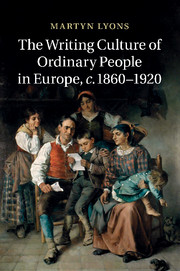Book contents
- Frontmatter
- Contents
- Illustrations
- Maps
- Acknowledgements
- Note on translations and transcriptions
- 1 Ordinary writings, extraordinary authors
- 2 Archives for an alternative history
- 3 ‘Excuse my bad writing’
- 4 Literary temptations
- 5 France
- 6 France
- 7 Family, village and motherland in the writing of Italian soldiers, 1915–1918
- 8 Italian identities ‘from below’ and ordinary writings from the Trentino
- 9 Love, death and writing on the Italian front, 1915–1918
- 10 Spain
- 11 Family strategy and individual identities in the letters of Spanish emigrants
- 12 Order and disorder in the ‘memory books’
- 13 Conclusions
- Bibliography
- Index
- References
5 - France
Transparency and disguise in the letters of the poilus, 1914–1918
Published online by Cambridge University Press: 05 November 2012
- Frontmatter
- Contents
- Illustrations
- Maps
- Acknowledgements
- Note on translations and transcriptions
- 1 Ordinary writings, extraordinary authors
- 2 Archives for an alternative history
- 3 ‘Excuse my bad writing’
- 4 Literary temptations
- 5 France
- 6 France
- 7 Family, village and motherland in the writing of Italian soldiers, 1915–1918
- 8 Italian identities ‘from below’ and ordinary writings from the Trentino
- 9 Love, death and writing on the Italian front, 1915–1918
- 10 Spain
- 11 Family strategy and individual identities in the letters of Spanish emigrants
- 12 Order and disorder in the ‘memory books’
- 13 Conclusions
- Bibliography
- Index
- References
Summary
The impossible language of death
Life on the western front was saturated with violence, and the sight of corpses was an everyday reality. The poilus lived in constant fear of death, but found the subject difficult to write about, or even to name except in predictable terms. They called it a barbarity, a massacre, a hecatomb, a hell. It was carnage, butchery or a combination of both, ‘une vraie carnagerie’, as one soldier put it. Another soldier of the 252nd Infantry regiment struggled hard to find words to express his experience:
What a slaughterhouse, what a gallows, that’s the right word for it, because these poor wretches are forced to remain a few dozen metres from the boches with broken machine-guns, no rifle, only a long knife, waiting for death at any moment. It certainly isn’t a war, because they can’t defend themselves. It’s just a guillotine […] I could never find words crude enough to describe this barbarous war.
The horror of continual bombardment, the presence of death and grotesque mutilation was impossible to express, and soldiers gave up trying. Louis Chirossel, a marble worker from Loriol who fought on Hill 263 in the Argonne, wrote to his wife of the impossibility of finding words to describe the violence: ‘There are some things, dear Eugénie, that, once witnessed, it would be impossible for even the best writer to describe.’ Chirossel witnessed a bombardment which he compared to a scene from a movie; ‘It would have made a wonderful film!’, he wrote, using the metaphor of cinema to distance himself emotionally from the actual destruction.
- Type
- Chapter
- Information
- Publisher: Cambridge University PressPrint publication year: 2012



